
10TH JUNE 1881
JACK THE RAILWAY DOG
Courtesy of Mick Symes
There have been many dogs over the years that have been associated with the railways, and
one such dog was well known dog was “Jack,” who was well known all over the L. B. & S. C. Railway.
JACK THE RAILWAY DOG
August 1879
“Jack” the railway dog. Whilst waiting at the Horsham station on Friday night for the 9.20 up train, our attention was attracted by a little rough dog which scampered up the platform and leaped up on to the engine. On making home enquiries of the guard in charge go the trains to the meaning of this eccentric behaviour on the part of the annual, we were informed that he was known as “Jack” the railway dog, and was in the habit of constantly travelling on the Brighton line from Lewes via Brighton and Horsham to London, and vice versa, generally travelling on the engine in fine weather, and in wet weather hob-mobbing with the guards in their breaks. nobody knows to whom he belongs, and he takes the food given him by the railwaymen’s a matter of course as recognised for his company. Jack has thoroughly warmed himself into the affections of the engine drivers and guards, both of whom take the greatest interest in their canine passenger; and should Jack ever fail to put in an appearance on the starting of the trains usually patronised by him, many are the enquiries, “ here’s our little dog, Jack.”
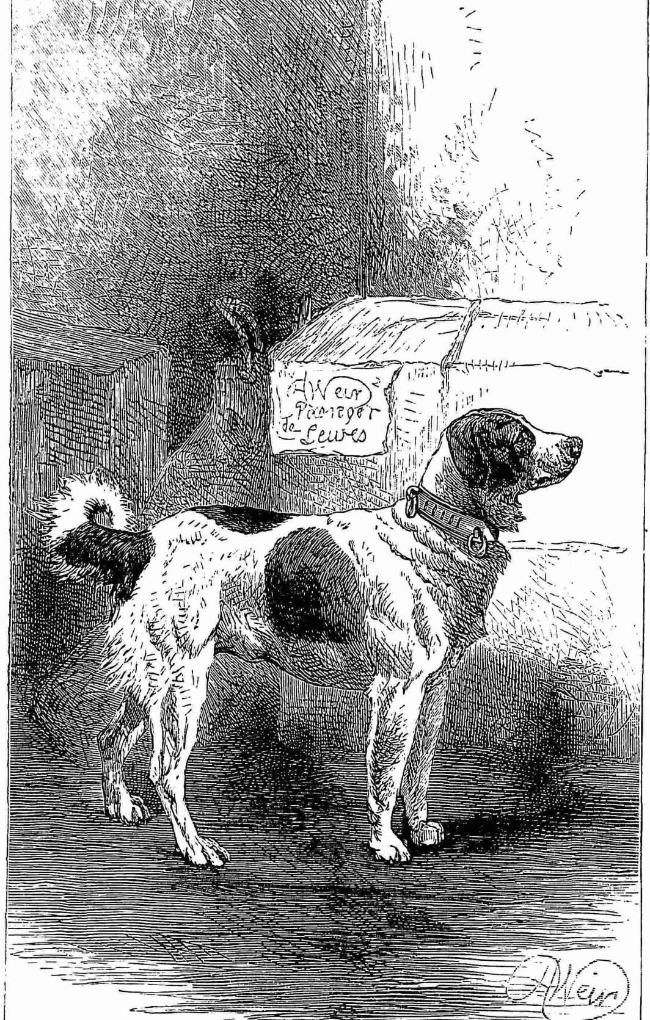
December 1880
“Bob”, the once well known fireman’s dog, has a rival in “Jack” the railway dog. This
sagacious animal passes his time in railway trains, and is well known at Brighton, Lewes,
Hastings, London Bridge, and Peckham Rye. He travels with the guard, and take his repose at whatever terminus the train he happens to be in at night times arrives at. His taste lies
peculiarly in the direction of all things appertaining to railways, as he will take no notice of
any one not wearing a railway uniform.
A South London guard on one occasion took him home. Jack went peacefully enough, but
directly the man changed his clothes, and put on the garments of everyday life, Jack began to be uneasy, and at length bolted back to Peckham Rye. Jack is quite unoriginal in his way.
21 January 1882
Accident to “Jack,” the Railway Dog. On Friday morning a serious accident happened to
“Jack,” the London, Brighton, and South Coast Railway dog. He was crossing the up main
line at Norwood Junction station when the Brighton mail train came along, and before the
animal could reach the platform the engine caught him, and crushed his foot. A local
veterinary surgeon was at once summoned by the officials, and the dog’s injuries having been attended to, he was placed in the care of a guard of an Eastbourne goods trains, by whom he was handed over to his master. Mr. Moore, the station master at Lewes. The accident has since necessitated the amputation of one of the dog’s legs, a surgeon very successfully performing the operation while the animal was under the influence of chloroform.
No difficulty is anticipated as to Jack’s future locomotion on three legs, although the radius of his operations will be necessarily more limited. Hitherto it has been from Paris to Scotland.
The last previous appearance of Jack in Lewes was when had just returned from a wedding at Berwick, and he arrived gaily beckoned with ribbons in honour of the event.
20TH JANUARY 1882
20TH JANUARY 1881
THE FATAL ACCIDENT AT THE RAILWAY STATION
The remains of the unfortunate young fellow Page (who died from injuries sustained in an accident on the goods station), were interred in St. John’s churchyard on Sunday afternoon. The funeral was attended by a large number of railway employees as well as of members of Court Lewes Castle A.O.F., of which the deceased was a member. “Railway Jack” was also present, wearing a crape collar.
The famous L. B. & S. C. Railway dog “Jack” has just reached Eastbourne station by one of the afternoon trains unexpectedly, and without guidance, otherwise than wonderful animal instinct to join in the procession of the funeral of Inspector Bryant, an official who had the honour of a large public burial. The noted dog just reached Eastbourne in time, found its way to the funeral, and solemnly followed the corpse to the cemetery, to the astonishment of everybody. The dog also joined the procession from the cemetery back again.
Railway Jack, the canine celebrity has just met with an accident which seemed likely to terminate his eccentric career. He had been absent from his home, Lewes Station, about a fortnight till brought back with his left foreleg crushed. Jack was at Norwood Junction late on the previous evening, and crossed the metals just as fast train was running through. He missed his hold in jumping on to the opposite platform, and fell under the engine of the approaching train. Jack’s left fore foot was completely crushed, and the radius servers fractured. The Norwood station master at once took him to a surgeon, who bound up the dog’s legal the same time expressing an opinion that the limb must either amputated or the animal killed. Mr. Moore, station superintendent at Lewes, was at once communicated with and the dog sent home. On arrival Jack was at once taken to Mr Stock, veterinary surgeon at Lewes, and, with the assistance of Mr. J.P. Braden, surgeon, he very successfully amputated the limb close to the shoulder, The operation was performed while the dog was under the influence of chloroform.
At a quarter past five their Royal Highnesses got back to station, where, at the especial quest of the Princess, Lady Brassey presented to her the famous “Railway Jack,” who had been sent on to Eastbourne from his home in the station master’s office at Lewes early in the day. The Princess, who had heard a great deal about the dog, was very glad to have this opportunity of seeing him, and she took away with her two photographs, one representing him seated up on a trunk before he lost his foreleg, the other taken since the accident, which has compelled him to a more sedentary existence.
November 1890
A famous dog, which had more than once had the honour of presentation to Royalty, died on Monday at the house of his master, Mr. F.G. Moore, Mayfield Sussex. Mr. Moore was
formerly stationmaster at Lewes, and his dog. “Railway Jack,” was known far and wide as a
traveller. He began by taking the train to Brighton and Newhaven, and then extended his
journey to London, Dover, and Canterbury, and after went as far afield as Exeter, Edinburgh, and Glasgow, but always returned to Lewes.
Once, at Eastbourne, the late Lady Brassey presented “Jack” to the Prince and Princess of
Wales, and he was introduced to Prince and Princess of Saxe Weimar at Cowes. He was a
great favourite everywhere, had three fine collars given him and a silver medal. “Jack” was
nearly thirteen when he ended his notable career.
7TH NOVEMBER 1890
15TH JULY 1881
26TH AUGUST 1881
16TH SEPTEMBER 1881
7TH OCTOBER 1881
2ND DECEMBER 1881
16TH DECEMBER 1881
30TH DECEMBER 1881
THE RAILWAY REVIEW
17TH MARCH 1882
THE RAILWAY REVIEW
24TH MARCH 1882
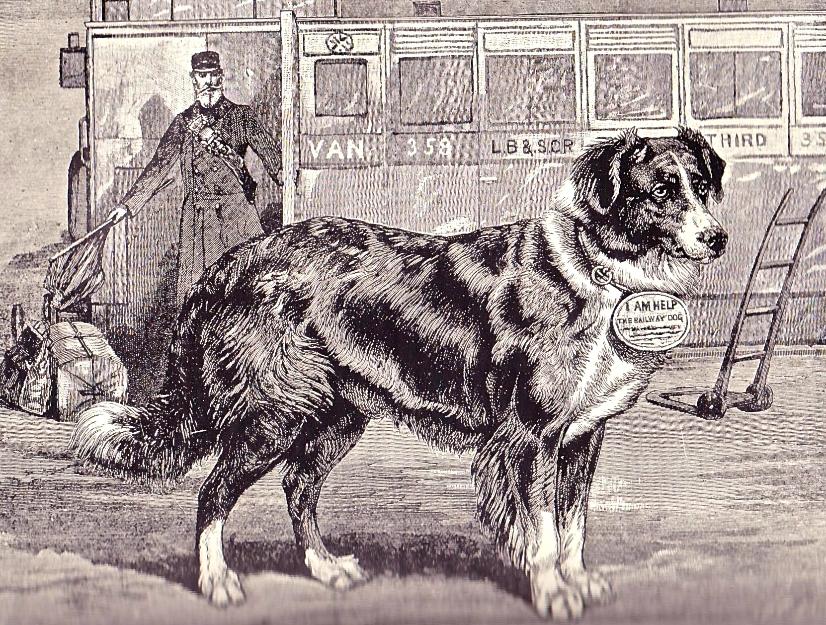
NATIONAL UNION OF RAILWAYMEN COLLECTION
Help the "Noble Railway Dog"
A faithful and clever animal formerly known to many passenger on the London and Brighton the tidal train between London Bridge and Newhaven for the Dieppe steam boats.
4TH APRIL 1882
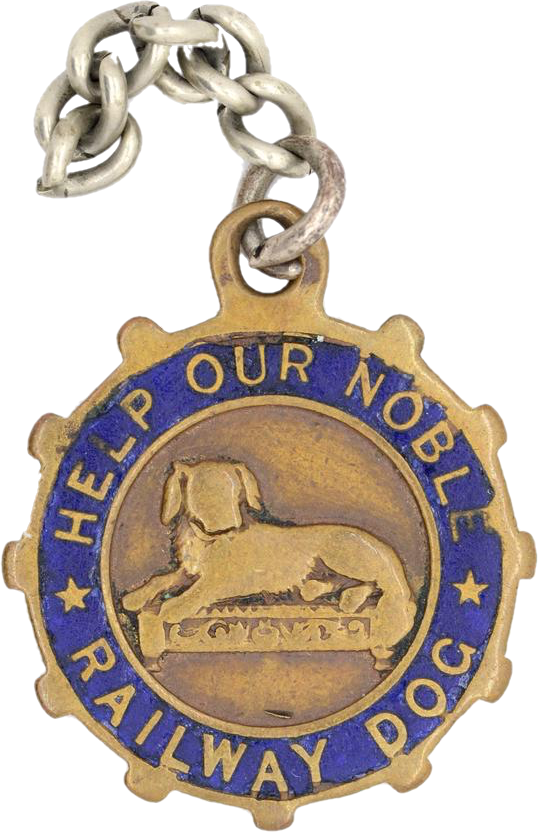
THE RAILWAY REVIEW
16TH JUNE 1882
The first railway dog can be traced back to 1881, he was called “Fred” and collected
money for the “Orphan Fund” of the Amalgamated Society of Railway Servants of England, Ireland, Scotland and Wales. Unfortunately Fred had a ver
This famous dog, a pure Scotch Collie was a gentle and beautiful creature. He was
recognised as the “Railway Dog of England,” and was a most successful commercial
traveller on behalf of the Railway Servants Orphan Fund.
During his life he collected £1004. (1882 -1891). Mr. John Climpson, a Brighton passenger guard of the evening tidal boat train from London Bridge to Newhaven on the London Brighton and South Coast Railway for close on forty years, conceived the idea of training a dog for collecting purpose, and to carry an innovation for money to be given by the the passengers and others in aid of the Orphan Fund. “Help” was supplied through the agency of the Rev. Dr. Norman Macleod, by the assistance of Mr. W. Riddell, of Hailes, Haddington, procured a suitable dog for the service; indeed, the animal was a gift from Mr. Riddell, and Help was admirably suited for the work.
After being trained by Mr. John Climpson, “Help” travelled extensively from 1882 until 1891 throughout England, Scotland, Ireland and Wales and twice crossed the channel to France.
He carried a handsome silver collar, bearing a handsome silver Medal endorsed “I am Help the railway dog of England, and travelling agent for the orphans railwaymen who are killed on duty” plus “My office is at 55, Colebrook Row, London, where subscriptions will be thankfully received and duly acknowledged,” to which interested persons could send donations.
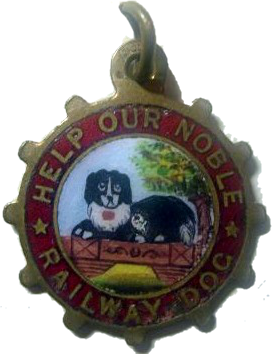
PHOTOGRAPHER UNKNOWN
Above is the rear of an Amalgamated Society of Railway Servants (A.S.R.S.) fob, which features the “Railway Dog”.
This fob/badge is extremely rare and is over 140 years old.

PHOTOGRAPHER UNKNOWN
Help is reproduced from a capital lithograph executed by the Newcastle artist,
Mr. Wilson Hepple
THE RAILWAY REVIEW
4TH AUGUST 1882
THE RAILWAY REVIEW
3RD NOVEMBER 1882
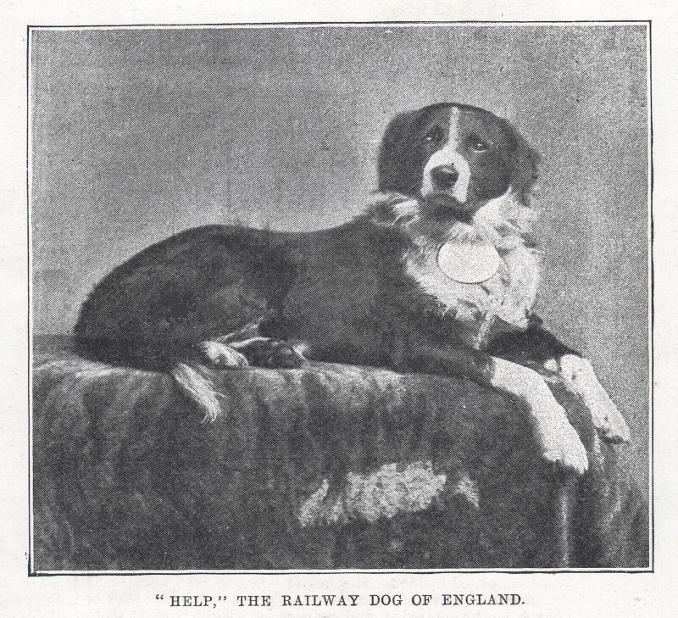
THE RAILWAY REVIEW
22ND DECEMBER 1882
THE RAILWAY REVIEW
29TH DECEMBER 1882
Over the coming weeks and months, the Dog "Help" did numerous visits across the length and breadth of the country, which included a couple of trips to France travelling between Newhaven and Dieppe. These visits raised much needed funds for the Orphanage Fund, and are recorded in various editions of the Railway Review.
THE RAILWAY REVIEW
10TH AUGUST 1883
THE RAILWAY REVIEW
31ST AUGUST 1883
Dog "Help," the society's collector for the Orphan Fund, after a brief period of rest, left London on Saturday last, his destination being Scarborough, which is so popular as a pleasure and health resort at this period of the year. On this way thither he spent Sunday at Selby and York, at both places receiving a hearty become from the railwaymen, their wives and children, and several sums were duly handed over to the local officers at these places to be placed to the dog's account. During this journey of 189 miles in the care of the general secretary, "Help's" behaviour, in a compartment of a carriage carry its full complement of passengers, was most exemplary, and he soon became a general favourite, so much so that as soon as his mission bane known, by the passengers reading the inscription on the medal which adorns his breast, the fund was benefited to the extent of several shillings as a result of the journey. On arriving at Scarborough on Monday "Help" soon became an object of attraction, and towards evening, when a large number of excursionists were returning from a day's pleasure, he had taken up a position on the platform, where dumbly though eloquently he pleaded the cause of railwaymen's orphans with some amount of success. As in all his former wanderings in Great Britain and on the Continent, he has found himself a good home among strangers, the railwaymen of Scarborough, from the stay as pleasant to himself and as profitable to the Orphan Fund.
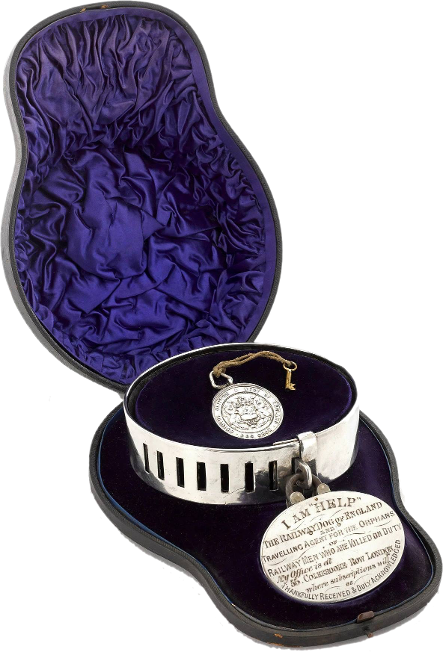
THE RAILWAY REVIEW
21ST SEPTEMBER 1883
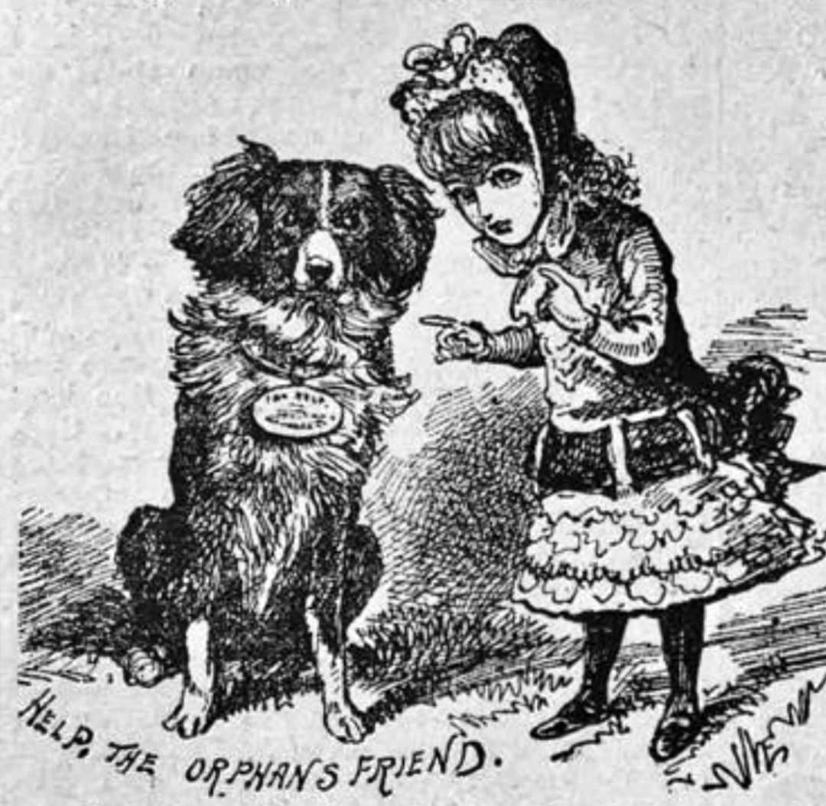

THE RAILWAY REVIEW
28TH SEPTEMBER 1883
Dog "Help" terminated his stay at Scarborough on Saturday last, and is now located in the ancient city of York. it is expected that he will accompany the general secretary to Edinburgh on the 1st October, to make the acquaintance of the delegated at the annual general meeting of the Amalgamated Society. It will be noticed by our readers that is is not only the inhabitants of the town or city where "Help" may be for a time staying that are contributions to the Orphan Fund. There are amounts come to hand weekly from friends to the cause at places he has visited some time ago, and from others where he has only been heard of or read about, who desire to swell the amount of the sum credited to the faithful animal's account for the railwaymen's orphans. The sum remitted to Help's trainer, Mr. J. Climpson, guard of the "night boat" train on the London, Brighton, and South Coast Railway, for the week is as follows :- Collected at Eastbourne station by Guard Scammell, 5s. 10d.; Miss L. Baughan, Cheltenham, 2s. 6d.; private collection box 3s. 4d.; M.B. 10s.; sale of photo, £1 2s. 8d.
LADY'S BROOCH
THE RAILWAY REVIEW
4TH JANUARY 1884
THE RAILWAY REVIEW
11TH JANUARY 1884
THE RAILWAY REVIEW
18TH JANUARY 1884
1ST FEBRUARY 1884
THE RAILWAY REVIEW
22ND FEBRUARY 1884
THE RAILWAY REVIEW
29TH FEBRUARY 1884
TERRIBLE TIDINGS
"This morning the well known Colley dog, 'Help,' which has been collecting subscriptions throughout the country on behalf of the Railway Servants' Orphan fund, London, was killed by a passenger train at a level crossing at Middlesbrough."
Such was the startling paragraph which met our gaze on looking through the special editions of the London evening papers just as we were going to press with our last week's issue. Knowing, however, that our canine friend should be nowhere near Middlesbrough, we declined then to accept the report; but when, on the following morning, it appeared in nearly all the daily papers, accompanied with articles couched in eulogistic terms, and biographies of the dog more or less inaccurate, the report was allowed to appear in our second edition, and telegram was sent to Worcester, the place to which "Help" was last dispatched. In reply thereto we were assured that he was well and happy, and was pursing his beneficent avocation with excellent results. This terrible burden off our minds, the press was at once communicated with, and the report of his untimely end contradicted. What foundation, if any, there was for the report we cannot conceive, and our Middlesbrough correspondent can throw no light on the matter. However, the dog is alive and well, and the episode shows us how popular he is throughout the country, and how wide his fame has spread.
"Help" is no "trick" dog, and he does not actually collect subscriptions as many suppose. He is simply a means to that end. His mute appeal, as he gazes into the faces of all who will notice him, is eloquent in the extreme, while he, at the same time, boldly displays the inscription on the silver pendant attached to his massive collar; and his fondness for children, whose cause he advocates, is such that the heart must be stony indeed that is not affected thereby. This idea of obtaining a sloth Colley for this purpose emanated from Mr. John Climpson, the popular guard of the "night boat train" on the London, Brighton, and South Coast Railway, who is one who is never weary of doing good, and seems never satisfied that he has done enough to help the helpless. His active brain is never exercised to try and find out what more he can do. his success in the matter of procuring and training a dog in the interests of the Railway Servants' Orphan fund was not achieved off hand. He had failures. One puppy that he had in training died of distemper, and a second shared the same fate; but he was not the man to quietly accept defeat. His mind was made up, and no question, of time, trouble, or expense would induce him to abandon his purpose. There was something to be done, and that something could be done, and should be done, and, thanks of the intervention of the Rev. Dr. Macleod, our friend "Help" was presented to the Orphan Fund by Mr. William Riddell, of Hailes, Haddington, whose, three young daughters inquire so affectionately after his welfare each time they send him their New Year's gift. Up to the end of last year the money raised through the instrumentally of "Help" rather exceeded £2 per week, which means that this faithful and docile creature relieves the Orphan Fund of the cost of supporting some half dozen orphans; or, in other words, that dog "Help," by his mute appeals, provides their needs. With such a result, Mr. Climpson has good reason to be satisfied with the outcome of his efforts. And it should be borne in mind that in collecting subscriptions for the Society's Orphan Fund, it is all done voluntarily: there are no salaries, and there are no commissions to absorb any portions of the money subscribed; and as regards "Help," with the exception of his food when taking a brief rest at headquarters, and the license - which the excise authorities are careful to exact, and his fares which are paid to the companies - all money raised by his aid goes straightaway for the benefit of the orphans. When "Help" is "on duty," as he nearly always is, his board and lodging is hospitality provided by the kind friend who has him in charge.
There is every reason to anticipate that "Help's" ledger account for the present year will be considerably in excess of any of previous years; for the more the travels for more widely he is known, as he quickly makes friends with all he comes in contact with, and his fondness for lavishing his canine on little children goes far to make him popular. His visits to various parts of late have been highly successful, and that to the recent dog show at Bristol was a decided hit. In four days no less a sum of fifteen pounds was found deposited in his box, and he was presented with a medal as a souvenir of his visit. Still it must have surprised his many intimate friends to find by the Press throughout the kingdom how far "Help's" game had spread. Many are the requisitions for his services, and numerous are the strangers who desire to set eyes on him; but seeing how ell he is doing at Worcester, it is but natural that his friends there should by anxious to keep him longer. however, he will fulfil all his engagements in time. "Every dog has his day," and lets us hope that "Help's" day will be a long one, and that he will be spared for many years to pursue his labour of love, and that when his end does come - as come it must some day - it will not be in any such way us that depicted in the terrible tidings which came to hand last week/ He deserves a better fate than which is too frequently met by those whose offspring he lives to succour.
-------
Since writing the foregoing, and just as we were going to press a light has been thrown on the origin of the reported death of dog "Help," in a note from the Middlesbrough branch secretary, "Help," which shows that the error on the part of the writer of that report was not so inexcusable as it at first sight appeared. We are told that Mr. Hardy, of the Crown Hotel, Middlesbrough, had a dog which greatly resembled "Help," and this dog was killed at the level crossing on the night named in the report. Like "Help," this dog was engaged on a mission of charity, in aid of the Cottage Hospital and North Riding Infirmary; and, added to this, while "Help" was at Middlesbrough, he stayed the greater part of his time at the Crown Hotel. The dog which was killed resided at "Help's" Middlesbrough home, resembled "Help" in appearance, and followed a similar calling. No great wonder, then, that the mistake arose. We are sorry for the poor dog who was killed, and sincerely sympathise with Mr. Hardy on his loss, the more particularly so when we remember that he it was who provided a hospitable home for our own faithful canine friend.
-------
OUR DOG NOT DEAD YET
It will be a source of great gratification to our numerous readers and sympathising correspondents to know that the excitement unnecessarily created by the untrue report that our good friend "Help" was dead may be allayed. From the almost innumerable inquiries which we received, we could almost have imagined that "Help" was well known to our Majesty's subjects as her Majesty herself, which somewhat goes to prove the axiom, "Love me, love my dog." Perhaps no dog has been so much honoured as "Help," by the announcement of his premature decease. Although we know that men have been distinguished by their obituaries having appeared before they were dead, dogs are not often honoured in this way. It would be curious to ascertain Lord Brougham's thoughts when he heard that he had died.
To the numerous orphans it must be a source of great thankfulness that our dog has not only had his day, but is spared to us yet another day, and we hope many days more for the purpose of doing his little best in the interests and welfare of those who cannot help themselves.
If dogs could think and speak, what would "Help" say about the following extracts, which have appeared about him in the Press:-
It was merely the lifeless body of a dog mangled and disfigured, that was found on the metals of the North Eastern Railway at Middlesbrough on Wednesday morning, after the passage of the Newcastle train. The life had been crushed out by the merciless wheels of the iron horse, and as it was only the life of a brute, there was an end of it. But what a life did that mangled body represent! It was not a long life, and yet how men who have passed the allotted span of three score years and ten could present such a record as that of the railway dog "Help," whose beneficent career was thus so sadly terminated! a few months ago the story of "Help's" life was told in the columns of the Leeds Mercury Weekly Supplement, and those who desire to know what sort of a dog he was will find an engraving of him in the October number of The Animal World. He was a pure Scotch collie, a genuine sheep dog, who had won his way into the heat of his first master in Roxburghshire, and who, because of his faithfulness and intelligence, was given to the work of the Railway Servants' Orphanage. He took to his work kindly, and after being trained by Mr. John Climpson, a guard on the "night boat train" of the London, Chatham, and Dover Railway*, he entered on his mission as "a collector." He had a free pass on all lines. Wherever he was sent he did his duty. He was at home on the Continent as well as in England or in Scotland. his collecting box, attached to a bright plated collar, with an inscription briefly setting forth who he was and his object, was his badge of authority. He could utter no words, but his appeals to the generosity and sympathy of this he encountered were made intelligible by the kindly eye and quiet, unobtrusive manner of "the collector." "Help," in fact, could speak in the language which is known all over the world, and it is stated that he collected on an average £100 a year. it is sad to think that a life so nobly spent should have been so miserably ended. We could almost envy the faith of the Indian, who believes in the future of his dog as well as of himself. At any rate, we trust that those whom "Help" served so well will not be unmindful of what they owe to him, and that there will be some record of the poor collie whose life was sacrificed in their service. - Leeds Mercury.*Should be London, Brighton, and South Coast Railway.
Everyone was grieved to read that the Colley dog "Help," who went about collecting money for the Railway Benevolent Fund, had come to an untimely end on the line. Unlike "Railway Jack," the report represented him as too much damaged to be repaired. talking about "Jack," who walks about with a wooden leg, I am reminded of the three legged dog I saw recently at a railway station just before you come to Civita Vecchia. It was a beautiful dog, and it came to beg at the carriage doors; but as it stood up the effect was almost laughable, as it stood entirely on one leg. The other was cut off close to the body. On inquiry I found it had been run over by a train, and amputation had been successfully performed. At the same station I was more than ever impressed with the hideous cruelty to animals openly practiced in Italy. I saw two poor little calves packed alive in an open hamper not big enough to hold a lamb. The poor little things were tied up in a round ball with ropes, their hind legs bound firmly to their heads, and the rope was drawn so tightly about them that they could hardly breathe. In this condition they were going by a slow train a distance of a hundred miles. The S.P.C.A. can do no good, I find, in Italy, as the people and the clergy ridicule the idea of being merciful to beasts "who have no souls." Moreover, the Italians are very jealous of English interference. I will not harrow the minds of my readers with the daily and hourly scenes of hideous cruelty to dumb beasts that I have witnessed. I shudder now as I think of the hapless lot of horses and dogs and cattle born under the sunny skies of the south. There is, however, one august lady who could save the present race and generation of dumb brutes yet unborn their lifelong burden of torture. If the tender hearted Queen of Italy would but take the matter up, her influence would be instantly beneficial and far spreading and enduring. is it not possible for our society here to broach the matter diplomatically in the right quarter?
An "Help" isn't killed after all. He is well and happy in Worcester. What is one to believe nowadays in the newspaper when they even invent the death of a dog to fill up an odd corner? Referce
There was at one time a general impression that dogs find their way home by the scent; but close observation of their habits had led most people to doubt the truth of this conclusion. Even those who accept this theory are quite unable to decide what scent the animals follow -whether the footsteps of their masters or the track of their own paws. A gentleman who had lived for three years at corner house of a street in London became convinced that his terrier, as it made it way whenever it was lost in any part of the metropolis unerringly to his doorstep, was guided by the keenest of its olfactory nerves. but when he at length removed to one of the centre of a row of houses in a dull West-end street, where each doorway was exactly the same in appearance, he was surprised to find his dog frequently, and for a period extending over two years, mistaking the door of someone else on the same side of the way for that of his master. There the dog would sit and persistently bark in order to gain admission; no amount of examination of the steps giving the animal any idea that he was waiting outside the wrong house. The inference afterwards drawn by the owner was that the terrier found his way, not by scent but by observation of objects; in short, in much the same way that the homing pigeon makes its way back; but with this manifest difference, that the latter trusts to its power vision alone, whereas the dog, probably by the examination, is enabled to recognise minute peculiarities at certain stages of his journey from which confirm him in his notion that he is on the right track. The degree of intelligence exhibited under such circumstances varies, however, to a remarkable extent among members of the canine race. A well known collie dog whose death is announced to day seems to have had the faculty developed in a marvellous degree of finding his way from one place to another. He was, in fact a sort of travelling agent for a very deserving institution, called the Railway Servants' Orphanage, which has it headquarters in London. it was no misnomer to have given him the name of "Help," for he has certainly greatly assisted in adding to the funds of the orphanage. For him the railway and those connected with it had a strange charm, and he seemed to be as much at home running about on a platform at Birmingham as he was on one in London. The history of his services has yet to be written, so that we are unable to say how much money he collected by his mute appeals, aided by the collar which he wore. yesterday morning "Help" was killed by a passenger train at Middlesbrough. -- Daily Chronicle.
Thackeray -- who hated Sterne -- lashes the author of "A Sentimental Journey" with a whip of scorn for shedding tears over dead jackass. Yet it is not difficult to imagine with what pathetic tenderness the creator of Colonel Newcome might himself have praised a dead dog -- no other than the famous Scotch collie "Help," who was run over and killed by a passenger train at a level crossing at Middlesbrough. it was the business and pleasure of this good creature's existence to collect subscriptions for the Orphan fund of the Amalgamated Society of Railway Servants, and in that capacity he travelled over a greater part of the country, always returning safe and sound to headquarters in the City road with the proceeds of his charitable mission intact. Last autumn "Help" paid a visit to the Continent, and was introduced by the captain of the steamship Brittany to Her Majesty's vice consul at Dieppe, at which town he collected one hundred and fifty francs. On the return journey to Newhaven he got six pounds more. Altogether the French trip yielded the society the sum of twelve pounds. the dog was trained to "offices of charity" by one of the guards of the night boat train on the London, Brighton, and South Coast Line. He seemed thoroughly to appreciate the usefulness of his career, and never lost an opportunity of adding to his employers' income. An annual of singularly engaging manners, great intelligence, and a most generous disposition, "Help" will be sincerely regretted by a large circle of admiring friends. Pope pleaded for the "faithful friend" of the "poor Indian" with "untutored mind" that he might "bear his master company" in the happy hunting ground of the future life. But no such appeal is necessary in this case. A dog's heaven is in his master's approving smile. "Help" lived and died doing his duty; and that man is fortunate; indeed who, dying, can have so much truly recorded for his epitaph. Daily Telegraph
Well might "Help" say: "There sic parades sic pomp, an' art,The joy can scarcely reach the heart" - of even dogs.Still in spite of all that has been said:-"His honest sons, bas't faceAy gets him friends in ilia place;His fine white breast, his towzie backWeel clad with coat of glossy black;His gawsie tail wi' upward curl,"
will make all our friends the more anxious to see what they can do to add to the great and good work which "only a dog" has done. But if the "general public" have felt and thought so much about "Help," what must have been the feelings of his trainer, John Climpson, and the good secretary of the Railway Servants' Society at the thought of losing so good a friend? We feel sure that everyone will be glad that "Help" is still spared to help on the good work that he been trained to, and rejoice in the fact that after all the fears that were excited in the hearts of the numerous friends the poor doggie made, there is this result - "good cometh out of evil."
-------
NOTES FROM THE NORTH.BY "SCOTIA."It was with bated breath we read the announcement in last Thursday's daily press, "The Death of a Famous Dog." After pursuing the paragraph in question, strange notions forced them-selves upon us. One thing we all displayed, a if moved and controlled by one instinct, vi., sorrow for the loss of our faithful Colley, who, like Burn's "Laugh,"
"Was a gush an' faithfu' tyke.As ever lap a hough or dyke:His honest, sonsie, baws'nt face,Aye gat hem friends in ilka place.His breast was white, his towzie backWeel clad wi' coat o' glossy black;His gauche tail, wi' upward curl,Hung o'er his hurries wi' a swurl."
And while lamenting the loss to the Orphan fund of its sagacious collector, we found some comfort in the hope that it might not, after all, be our "Help," but some northern tyke steering south without a guide, rather than bear the scanty fare and chilling air of his native heath. Singular to state, in twenty four hours our hopes were realised, by a contradiction of the grave news, with the additional information that "Help" is pegging away some three hundred miles from Middlesbrough. we trust that no epitaph need be written for our worth dog inside the next. ten years.
THE RAILWAY REVIEW
7TH MARCH 1884
THE RAILWAY REVIEW
14TH MARCH 1884
THE RAILWAY REVIEW
21ST MARCH 1884
THE RAILWAY REVIEW
27TH JUNE 1884
Published in around 1884 by The Railway Servants Orphan Fund, this song is written from the perspective of Help, a collie dog, who had a very important job. Known as the ‘Railway dog of England’, Help’s job was to travel on the trains and collect donations for the Railway Servants Orphan Fund. Railway work was a dangerous occupation, and there were numerous charities of this sort set up to provide support for the families of railwaymen who were killed or injured in the course of their work.
THE RAILWAY REVIEW
19TH SEPTEMBER 1884
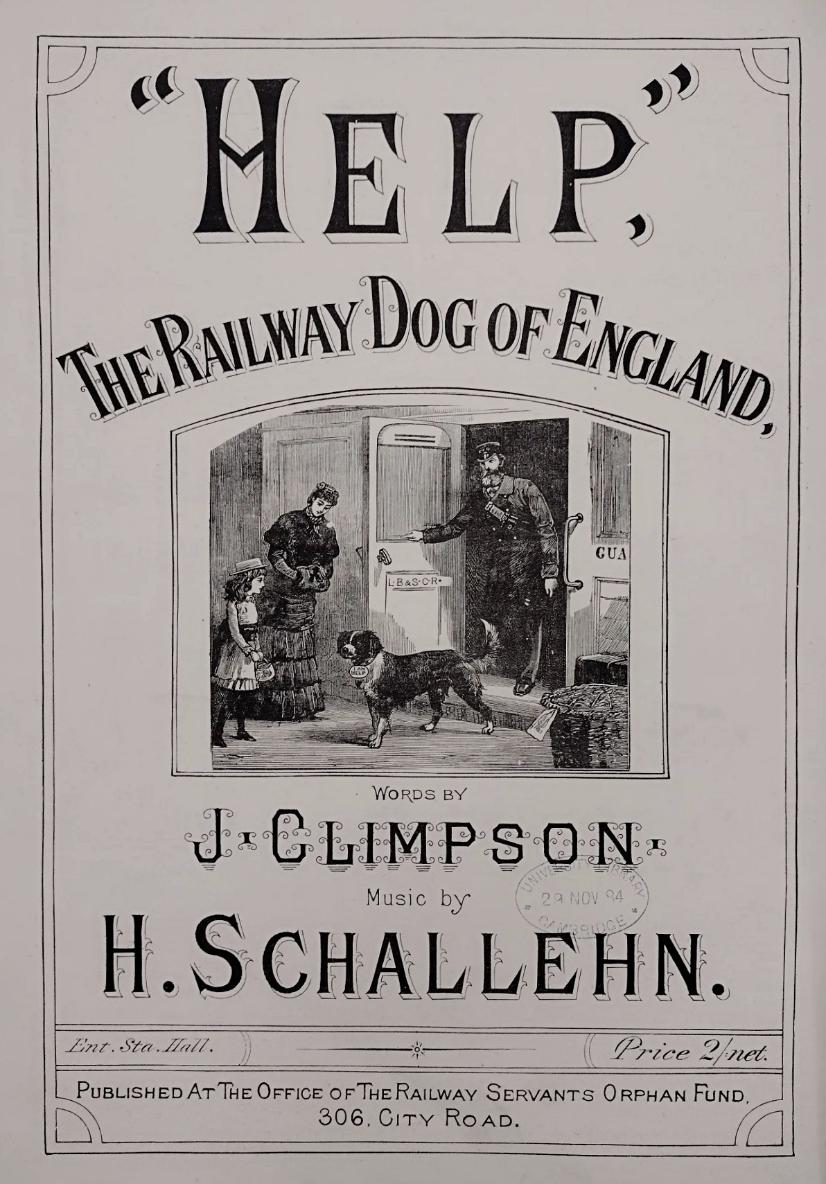
The words to the song were written by John Climpson, a Brighton train guard who had worked on the London, Brighton and South Coast Railway for many years. Help was given to Climpson by Scottish dog breeder William Riddell, after Climpson had the idea of using a good-natured dog to collect funds. Help was given no special training, but simply allowed to travel about on the railway network with a wooden collecting box and a collar with a medal explaining his mission. The chorus of the song describes Help’s occupation:
My name is “Help” the Collie Dog And I travel on the rail. To canvass for the Orphan Fund In slow train, or the mail. My post is trusty you must know. The cause is good and true, And worthy of the kind support Which I now ask of you.
“Help” The Railway Dog of England.
This animal, of the pure Scotch colley breed, is the property of the Amalgamated Society of Railway Servants. The Dog’s mission is to obtain aid for the fatherless children of railway servants – and well does he perform his task, judging from the sums of money he has already brought to the society’s exchequer from the various towns and villages in which he has periodically taken up his abode. Gentle, and docile, he easily establishes himself as a family pet, every member being his guardian friend. He will follow, without leading, any railwayman with whom he has had a few hours acquaintance, while he will allow the children of a household to caress and fondle him, romping and playing with them gaily, and with spirit. The idea of keeping and training a dog to act as a medium for collection of money in aid of the Railway Servants’ Orphan Fund originated with Mr John Climpson, the popular guard of the “night boat train” on the London, Brighton, and South Coast Railway – a position which he has filled for over twenty seven years. Having conceived the idea, the Rev. Dr Macleod was made acquainted with the object for which a dog of the Scotch colley breed was required. The venerable doctor was struck with the good purpose to which the dog would have to devote himself, and made inquiries among his friends and as a result, Mr William Riddell, of Hailes, Haddington, very generously proffered the subject of this sketch, as a present to the Orphan Fund.
For some time the sums collected for the Orphan Fund by means of “Help” have averaged considerably over £5 per week; a subscription which helps to maintain several families of orphans. He has not been trained to perform any antics, so that his mission only is known by a handsome silver collar, to which is appended a medal bearing the following inscription: – “I am “Help” the Railway dog of England, and travelling agent for the orphans of railwaymen who are killed on duty. My office is at 306, City Road, London, where subscriptions will be thankfully received and duly acknowledged.”
He has been to a large number of the principal towns in England and Wales, and has twice crossed the Channel to France. It is to be hoped that “Help” will live many years to help those who cannot help themselves.
Help did indeed live many more years to carry out his duties on the railway, before retiring to live a more restful life in Newhaven. His death in 1891 was reported by the Railway Review, who estimated that he had collected “upwards of £1000 for the Orphan Fund”. The success of Help as a fundraiser meant that other railway companies followed suit – other ‘railway dogs’ included Brake, the Southsea and Ryde collecting dog, and Prince, who collected donations at Croydon station
THE RAILWAY REVIEW
10TH OCTOBER 1884
THE RAILWAY REVIEW
30TH JANUARY 1885
THE RAILWAY REVIEW
10TH JULY 1885
THE RAILWAY REVIEW
14TH DECEMBER 1888
NEW PORTRAIT OF "HELP"
A new successful portrait of dog "Help" has been published by Wilson Hepple, artist, 7, Gallowgate, Newcastle-on-Tyne. When framed it makes a good picture, and is worthy of a place on the walls of the homes of railwaymen. The price (1s.) is within reach of all, and,
taking into account the excellence of the picture, is, in our opinion, very cheap. Copies can be ordered from the Head Offices of the A. S. R. S., 55, Colebrooke Row, London, N.
THE RAILWAY REVIEW
13TH DECEMBER 1889
THE RAILWAY REVIEW
11TH DECEMBER 1891
THE RAILWAY REVIEW
13TH DECEMBER 1889
BRIGHTON BOB
Brighton Bob mixed with commuters, sometimes boarding trains on their own to encourage more giving by passengers. He barked, “ hook hands” and performed tricks for money, their exploits frequently reported in the national and regional press.
Brighton Bob could be a bit dishonest, he collect coins in his mouth and gave them in, but secure boxes had to be tied to him after a journalist for a Christian magazine discovered in the 1860s that Brighton Bob was using some of his money to buy biscuits at a bakery.
Railway dogs, were usually looked after and trained by railway staff and proved popular and lucrative.
Information extract & adapted from the
Old Southeronians Association Website
Which was written
By H.T. Hunt
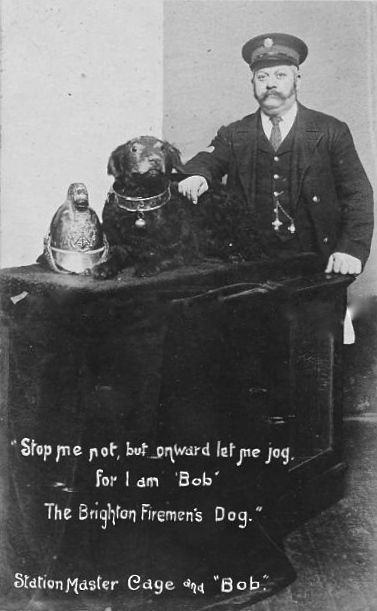
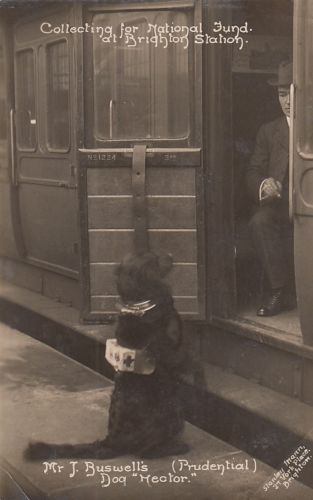
PHOTOGRAPHER UNKNOWN
Brighton Railway Dog ‘Hector’ & National Fund C1914